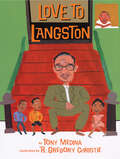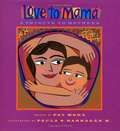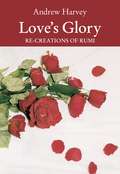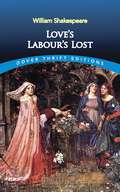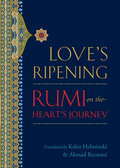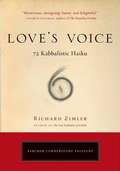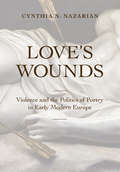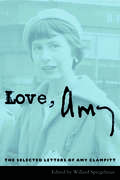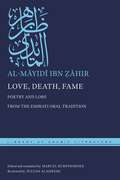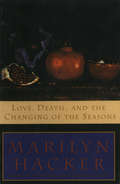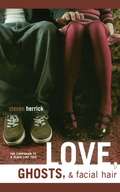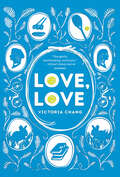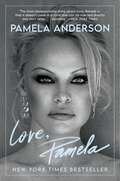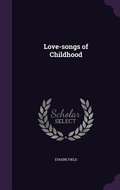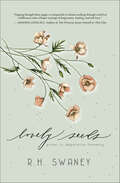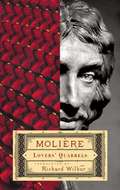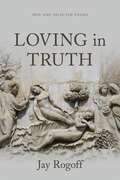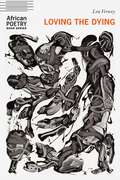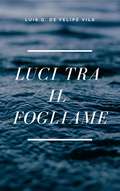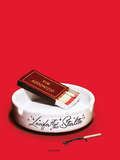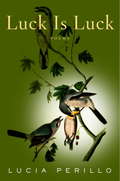- Table View
- List View
Love to Langston
by Tony MedinaThis inspiring biography on Langston Hughes celebrates his life through poetry.Fourteen original poems offer young readers an exciting glimpse into the life of Langston Hughes, one of America's most beloved poets. Each of Medina's engaging poems explores an important theme in Hughes' life - his lonely childhood, his love of language and travel, his dream of writing poetry. Extensive notes at the back of the book expand upon the poems, giving a broader picture of Hughes' life and the time in which he lived. With stunning illustrations by R. Gregory Christie, Love To Langston brings Langston Hughes to life for a new generation of readers.
Love to Mama: A Tribute to Mothers
by Pat MoraFourteen Latino poets pay tribute to their mothers and grandmothers in this touching volume. With verses written in English and generously peppered with Spanish words and expressions, Love to Mama offers a look at the maternal touches that remain with us forever.
Love's Glory: Re-creations of Rumi
by Andrew Harvey Jalal ud-Din RumiIn Love's Glory, mystical scholar Andrew Harvey presents 108 stunning short poems by the thirteenth-century Sufi mystic and poet Rumi. Working from translations in various languages and drawing on two decades of studying Rumi's work, Harvey's "re-creations" are arranged in a dance around crucial mystical themes: nondual bliss, ordeal, ecstatic recognition, revelation, and gratitude. "These short poems by Jalal-ud-Din Rumi, humanity's most passionate and exalted mystic poet, are telegrams from Supreme Consciousness, sharp, dazzling, electric messages directly from Rumi's Awakened Heart to our own, word-mirrors held up to us by Love itself so we can glimpse our own real face."--from the Introduction
Love's Labour's Lost (Dover Thrift Editions: Plays)
by William ShakespeareIn this charming comedy of manners, one of Shakespeare's earliest efforts in the genre, a well-intentioned king vows to forego all fleshly delights, setting the stage for romantic hijinks. Ferdinand, the king of Navarre, insists that his court join him in a pledge to undertake a strict regimen of study and celibacy. The grudging compliance of three noblemen is sorely tested — as is the king's own resolve — with the arrival of a French princess and a trio of comedy attendants.First performed in 1594, Love's Labour's Lost features such typical Shakespearean elements as lovers in disguise, a witty clown, and an abundance of sparkling repartee. The play's role as a formative work (the plot is thought to be entirely of Shakespeare's invention) makes it of particular interest to students and scholars, and its merry doings and high spirts recommend it to all.
Love's Ripening: Rumi on the Heart's Journey
by Kabir Helminski Mevlana Jalaluddin Rumi Ahmad RezwaniLove is the meaning of our existence, the raw material of transformation, the glorious way of access to Divine intimacy. This teaching infuses the lyric verse of Rumi (1207-1273), the greatest of the Sufi poets. The poems in this collection, taken from among the master's many volumes of work, focus on one of his greatest themes: how love grows and matures for those on the spiritual path. Kabir Helminski and Ahmad Rezwani have crafted a translation that remains faithful to the original Persian while giving eloquent expression to the joy of Rumi's astonishing encounter with the Divine.
Love's Voice
by Richard ZimlerThese aphoristic gleanings of ancient and mystical philosophy- written in the form of haiku by award-winning novelist Richard Zimler- capture the heart of the tradition in ways that are personally awakening. Love's Voice is a doorway to Kabbalah for readers at all levels of experience. Acclaimed novelist Richard Zimler uses the form of haiku to distill Kabbalistic philosophy into its most essential form, providing a rare and deeply affecting experience of the wisdom of the ages. These seventy-two haiku require no special knowledge of Kabbalah or, indeed, of Jewish culture. Readers who do have some background in Kabbalah will find additional-and sometimes hidden-references and meanings in many of these verses. Every passage in Love's Voice verse is a memorable meditation that will touch each reader in a different way. Here is a greatly original yet historically framed entry point to an extraordinary mystical tradition. .
Love's Wounds: Violence and the Politics of Poetry in Early Modern Europe
by Cynthia N. NazarianLove's Wounds takes an in-depth look at the widespread language of violence and abjection in early modern European love poetry. Beginning in fourteenth-century Italy, this book shows how Petrarch established a pattern of inequality between suffering poet and exalted Beloved rooted in political parrhēsia. Sixteenth- and early seventeenth-century French and English poets reshaped his model into an idiom of extravagant brutality coded to their own historical circumstances. Cynthia N. Nazarian argues that these poets exaggerated the posture of the downtrodden lover, adapting the rhetoric of powerless desire to forge a new "countersovereignty" from within the heart of vulnerability—a potentially revolutionary position through which to challenge cultural, religious, and political authority. Creating a secular equivalent to the martyr, early modern sonneteers crafted a voice that was both critical and unstoppable because it suffered.Love’s Wounds tracks the development of the countersovereign voice from Francesco Petrarca to Maurice Scève, Joachim du Bellay, Théodore-Agrippa d’Aubigné, Edmund Spenser, and William Shakespeare. Through interdisciplinary and transnational analyses, Nazarian reads early modern sonnets as sites of contestation and collaboration and rewrites the relationship between early modern literary forms.
Love, Amy: The Selected Letters of Amy Clampitt
by Amy ClampittThis extraordinary collection of letters sheds light on one of the most important postwar American poets and on a creative woman's life from the 1950s onward. Amy Clampitt was an American original, a literary woman from a Quaker family in rural Iowa who came to New York after college and lived in Manhattan for almost forty years before she found success (or before it found her) at the age of 63 with the publication of The Kingfisher. Her letters from 1950 until her death in 1994 are a testimony to her fiercely independent spirit and her quest for various kinds of truth-religious, spiritual, political, and artistic.Written in clear, limpid prose, Clampitt's letters illuminate the habits of imagination she would later use to such effect in her poetry. She offers, with wit and intelligence, an intimate and personal portrait of life as an independent woman recently arrived in New York City. She recounts her struggle to find a place for herself in the world of literature as well as the excitement of living in Manhattan. In other letters she describes a religious conversion (and then a gradual religious disillusionment) and her work as a political activist. Clampitt also reveals her passionate interest in and fascination with the world around her. She conveys her delight in a variety of day-to-day experiences and sights, reporting on trips to Europe, the books she has read, and her walks in nature. After struggling as a novelist, Clampitt turned to poetry in her fifties and was eventually published in the New Yorker. In the last decade of her life she appeared like a meteor on the national literary scene, lionized and honored. In letters to Helen Vendler, Mary Jo Salter, and others, she discusses her poetry as well as her surprise at her newfound success and the long overdue satisfaction she obviously felt, along with gratitude, for her recognition.
Love, Death, Fame: Poetry and Lore from the Emirati Oral Tradition (Library of Arabic Literature #67)
by al-Māyidī ibn ẒāhirPoems and tales of a literary forefather of the United Arab EmiratesLove, Death, Fame features the poetry of al-Māyidī ibn Ẓāhir, who has been embraced as the earliest poet in what would later become the United Arab Emirates. Although little is known about his life, he is the subject of a sizeable body of folk legend and is thought to have lived in the seventeenth century, in the area now called the Emirates. The tales included in Love, Death, Fame portray him as a witty, resourceful, scruffy poet, at times combative and at times kindhearted.His poetry primarily features verses of wisdom and romance, with scenes of clouds and rain, desert migrations, seafaring, and pearl diving. Like Arabian Romantic and Arabian Satire, this collection is a prime example of Nabaṭī poetry, combining vernacular language of the Arabian Peninsula with archaic vocabulary and images dating to Arabic poetry’s very origins. Distinguished by Ibn Ẓāhir’s unique voice, Love, Death, Fame offers a glimpse of what life was like four centuries ago in the region that is now the UAE.A bilingual Arabic-English edition.
Love, Death, and the Changing of the Seasons
by Marilyn HackerThis critically acclaimed sonnet sequence is the passionately intense story of a love affair between two women, from the electricity of their first acquaintance to the experience of their parting.
Love, Ghosts, & Facial Hair
by Steven HerrickJack's got a lot on his mind: He's trying to figure out the mystery of the opposite sex, he can't stop wondering about facial hair, and he won't let go of his mother's ghost, even though she died seven years ago. Jack knows he can't hang on to the past forever, but what he doesn't know is how to let go. Then he meets Annabel. She's beautiful, smart, and she gets him. Suddenly love makes sense, and the future seems hopeful. And for the first time, Jack feels ready to leave the past where it belongs...
Love, Love
by Victoria ChangIn this beautiful novel in verse, a Chinese-American girl contends with school bullies, tries to solve the mystery of her sister's strange illness, and finds strength and validation at the local tennis court. Frances Chin, a 10-year old Chinese-American girl, lives in the suburbs of Detroit with her immigrant parents and older sister, Clara. At school Frances copes with bullies and the loneliness that comes with not quite fitting in. At home, she feels a different kind of aloneness. Her parents are preoccupied with work and worry about Clara, whose hair is inexplicably falling out. But, with the help of her friend Annie, Frances is determined to play Nancy Drew and solve the mystery of Clara&’s condition. She also faces the everyday challenges and unexpected thrills of being a tween, especially when she receives encouragement from a tennis coach. Although she struggles to speak up, Frances&’s powerful inner voice resonates in gorgeous imagery and evocative free verse."Love and more love to Victoria Chang for her lyrical and gentle prose poems that, in excavating a deep secret, usher readers beyond shame and into the warmth of understanding." —Thanhhà Lại, New York Times bestselling and National Book Award-winning author of Inside Out & Back Again, and most recently Butterfly Yellow
Love, Pamela: A Memoir
by Pamela AndersonThe actress, activist, and once infamous Playboy Playmate reclaims the narrative of her life in a memoir that defies expectation in both content and approach, blending searing prose with snippets of original poetry.In this honest, layered and unforgettable book that alternates between storytelling and her own poetry, Pamela Anderson breaks the mold of the celebrity memoir while taking back the tale that has been crafted about her.Her blond bombshell image was ubiquitous in the 1990s. Discovered in the stands of a football game, she was immediately rocket launched into fame, becoming Playboy’s favorite cover girl and an emblem of Hollywood glamour and sexuality. But what happens when you lose grip on your own life—and the image the notoriety machine creates for you is not who you really are?Growing up on Vancouver Island, the daughter of young, wild, and unprepared parents, Pamela Anderson’s childhood was not easy, but it allowed her to create her own world—surrounded by nature and imaginary friends. When she overcame her deep shyness and grew into herself, she fell into a life on the cover of magazines, the beaches of Malibu, the sets of movies and talk shows, the arms of rockstars, the coveted scene at the Playboy Mansion. And as her star rose, she found herself tabloid fodder, at the height of an era when paparazzi tactics were bent on capturing a celebrity’s most intimate, and sometimes weakest moments. This is when Pamela Anderson lost control of her own narrative, hurt by the media and fearful of the public’s perception of who she was…and who she wasn’t.Fighting back with a sense of grace, fueled by a love of art and literature, and driven by a devotion to her children and the causes she cares about most, Pamela Anderson has now gone back to the island where she grew up, after a memorable run starring as Roxie in Chicago on Broadway, reclaiming her free spirit but also standing firm as a strong, creative, confident woman.
Love-Songs of Childhood
by Eugene FieldA collection of poems by Eugene Field, the American writer, best known for poetry for children and for humorous essays. He first started publishing poetry on the side in 1879, when his book Christian Treasures appeared. Over a dozen more volumes followed, and he became well known for his light-hearted poems for children; perhaps the best known is Wynken, Blynken, and Nod.
Lovely Seeds: Prose to Depolarize Humanity
by R. H. SwaneyìExplores the beauty that can be found in even the most hopeless of situations.îóCyrus Parker, author of DROPKICKromanceìEvery page is a gentle reminder to take care of yourself. Lovely Seeds will help you be ok with being you.îóIain S. Thomas, author of I Wrote This For YouR. H. Swaney brings a depolarizing voice to the poetry world with this debut collection. Amongst the topics of mental health, self-love, and social progress, readers will find a soft but powerful voice that uncovers the beauty that exists inside of all of us.Examining life and its circle from seed to withering to regrowth, the thought-provoking nature of this collection will bring readers to a place of self-exploration, reflection, and a deeper understanding of their place in the world.
Lovers' Quarrels
by Richard Wilbur Jean Baptiste De Molière"I came to see that a line that simply says 'I love you,' at the right point in the show, is entirely adequate, that a great deal of verbal sophistication is not necessarily called for. . . . Speak-ability is so important. That's something I slowly had to learn about poetry, and something I had to work on always with Molière."--Richard WilburLovers' Quarrels is Molière's second full-length verse play, animated with deception and tangles of love.Richard Wilbur is a two-time winner of the Pulitzer Prize and a former Poet Laureate of the United States. His verse translations of Molière's plays have been performed for audiences throughout the world.
Lovetalk: How to Say What You Mean to Someone You Love
by Lois Wyse[from inside flaps] "In a world where love is used and abused, Lovetalk explores the love we feel but fail to express. Instead of explaining our deepest feelings with, "Oh, you know what I mean," Lovetalk proposes that we say what we mean. This is more than a how-to book; it's a why-not book as well. Why not help your love fulfill its prophecy of hope? Why not discover your strengths and weaknesses, and use them as tools in building a world of Us, instead of a world of you or me? Most of all, Lovetalk asks: Why not live a loving life. Let Lovetalk blaze the trail, and teach you to talk to your needs and fears in order to love in a totally new, totally free way."
Loving in Truth: New and Selected Poems
by Jay RogoffDrawing on forty years of published work, Jay Rogoff’s Loving in Truth: New and Selected Poems marks a milestone in the career of this confident, wise, and rigorous poet. The volume presents over one hundred poems from earlier collections alongside forty-seven poems previously unavailable in book form. Throughout his body of work, Rogoff skillfully interweaves craft and feeling as he contemplates immigrant ancestors, foreign adventures, baseball, ballet, and the uncanny entwinings of art and life. The new poems form three sharply etched sequences. In turn, Rogoff presents a series of short, wry poems in tribute to his wife and muse; reimagines Genesis’s story of the creation and fall in a progression of enigmatic ballads inspired by Lorenzo Maitani’s reliefs on the façade of Orvieto Cathedral; and expands upon a theme that has always suffused his art, the interconnectedness of love and death. Both a valuable compendium of his finest work and a powerful introduction to his range of gifts, Loving in Truth offers a thorough immersion in the poetry of Jay Rogoff.
Loving the Dying (African Poetry Book)
by Len VerweyLoving the Dying is a collection of poems on life&’s different stages. Set against the backdrop of a conflicted society, Len Verwey looks at a person&’s life from youth and growing up to aging and dying, considering what the ineluctable reality of death might imply about how we should think about our lives. These are poems of uncertainty rather than certainty. The more overtly biographical ones end with as many questions as they start with, and there is often sympathy for the outsider or the marginalized voice. Varying in tone and complexity, Verwey&’s poems focus on the tension between escapism and reality, truth and delusion (for individuals and societies), and the need to face death if we are to care for the aged and learn to understand the process of dying. As in his first poetry collection, In a Language That You Know, Verwey continues his effort to understand the successes and failures of the South African post-apartheid journey, with both humor and some despair.
Lošalaba Lwa Bomme: UBC Contracted
by B. D. Magoleng S. F. MotlhakeBuka e, e tshotse maboko a a itlhametsweng, a a itshetlegileng thata mo maitemogelong a mo botshelong, e etse tlhoko segolo bogolo ditiro tse motho a di dirang, gantsi tse di botlhoko – a se na letswalo le kutlwelobotlhoko.
Lošalaba Lwa Bomme: UBC Uncontracted
by B. D. Magoleng S. F. MotlhakeBuka e, e tshotse maboko a a itlhametsweng, a a itshetlegileng thata mo maitemogelong a mo botshelong, e etse tlhoko segolo bogolo ditiro tse motho a di dirang, gantsi tse di botlhoko – a se na letswalo le kutlwelobotlhoko.
Luci tra il Fogliame
by Luis G. de Felipe VilaLa poesia, la roba vera di cui sono fatti i sogni, è scritto con in misura diseguale del cuore e della mente, le emozioni e la ragione. C'è una poesia più intellettuale e c'è una poesia più emotiva, secondo come la musica dei versi suona all'interno del poeta
Lucifer at the Starlite: Poems
by Kim AddonizioA lyrically intense fifth collection from "one of the nation's most provocative and edgy poets" (San Diego Union-Tribune). With both passion and precision, Lucifer at the Starlite explores life's dual nature: good and evil, light and dark, suffering and moments of unexpected joy. Whether looking outward to events on the world stage--the war in Iraq, the 2004 Asian tsunami--or inward at struggles with the self, these poems aim at the heart and against the feeling that Lucifer may have already won the day. from "Lucifer at the Starlite" Here's my bright idea for life on earth: better management. The CEO has lost touch with the details. I'm worth as much, but I care; I come down here, I show my face, I'm a real regular. A toast: To our boys and girls in the war, grinding through sand, to everybody here, our host who's mostly mist, like methane rising
Luck Is Luck
by Lucia PerilloFrom the snowy egret to a woman’s floating rib, nudism in America to Holy Communion, Simone de Beauvoir to Nathan’s hot dogs–the subjects in Lucia Perillo’s fourth collection of poetry lift off from surprising places and touch down on new ground. Hers is a vision like no other. In “To My Big Nose,” she muses: “hard to imagine what the world would have looked like / if not seen through your pink shadow. / You who are built from random parts / like a mythical creature–a gryphon or sphinx–. ” Fearless, focused, ironic, irreverent, truly and deeply felt, the poems in Luck Is Luck draw upon the circumstances of being a woman, the harsh realities of nature, the comfort of familiar things, and universally recognizable anxieties about faith and grief, love and desire. In “Languedoc,” she writes, “Long ago / I might have been attracted by your tights and pantaloons / but now they just look silly, ditto for your instrument / that looks like a gourd with strings attached / (the problem is always the strings attached). ” Perillo’s versions of nature are always unflinching: “Most days back then I would walk by the shrike tree, / a dead hawthorn at the base of a hill. / The shrike had pinned smaller birds on the tree’s black thorns / and the sun had stripped them of their feathers. / . . . well, hard luck is luck, nonetheless. / With a chunk of sky in each eye socket. / And the pierced heart strung up like a pearl. ” Down-to-earth, full of playful twists of language, and woven from grand themes in an accessible, appealing way, these poems pierce the heart and delight the mind. Not one word is wasted. From the Hardcover edition.
